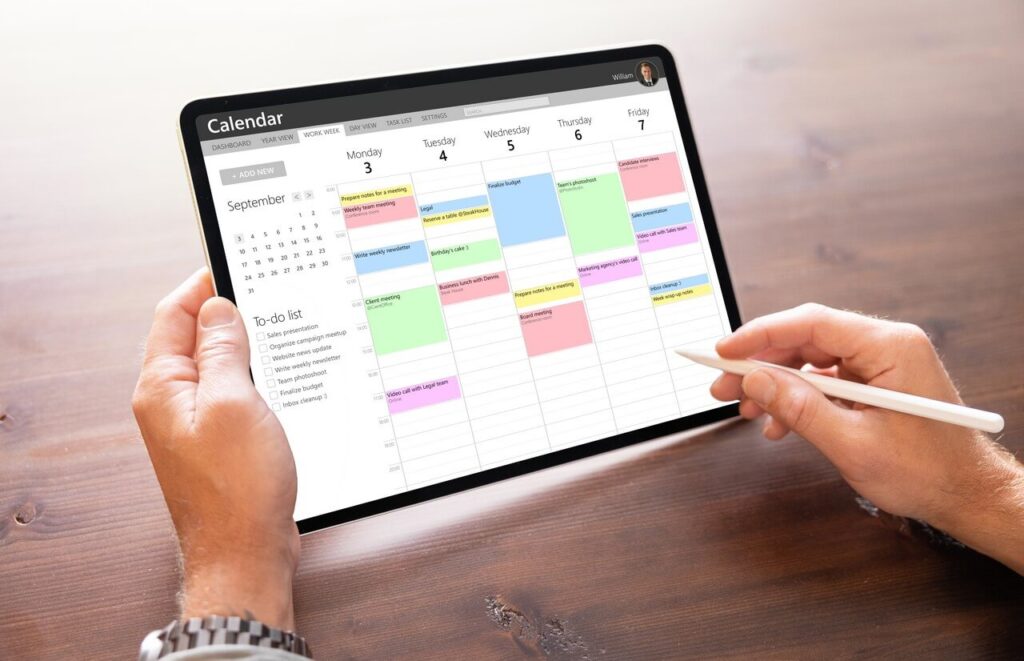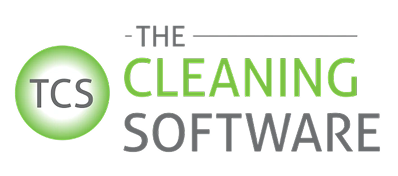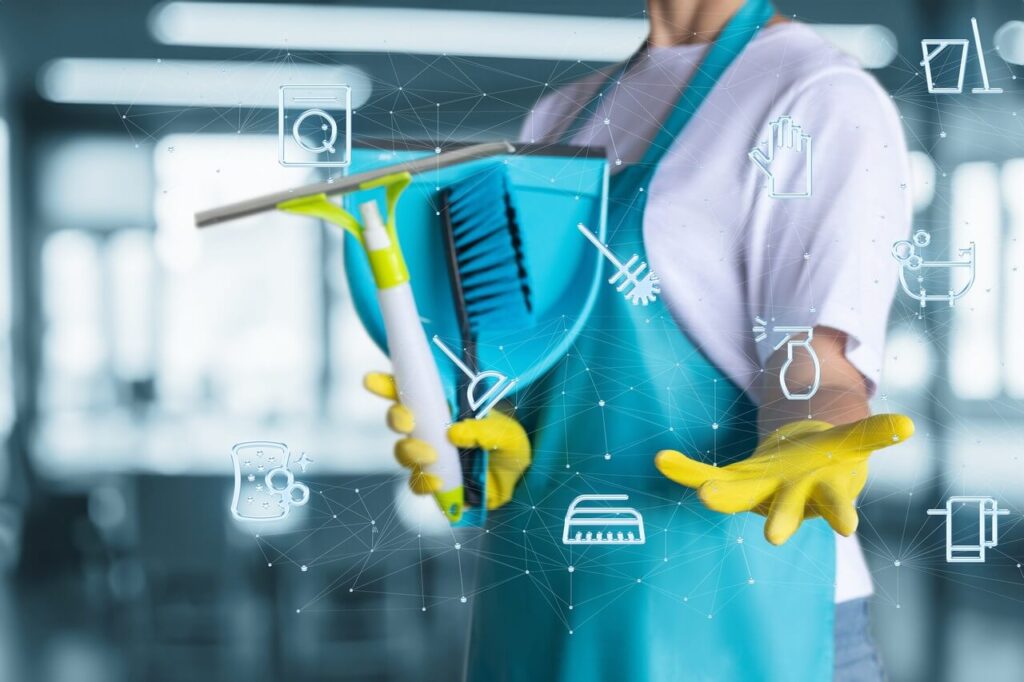Running a cleaning business is rewarding, but most owners would admit the actual cleaning is the easy part. The real headaches come from what happens behind the scenes:
- Filling and adjusting daily schedules
- Keeping communication clear with cleaners and clients
- Tracking hours, mileage, payroll, and billing
- Coordinating multiple cleaners or teams
- Staying organized and fixing mistakes before they spread
Even small gaps in organization can snowball. A double booking upsets a client, a missed reminder causes a no-show, and one error in payroll creates disputes that eat into your week. That’s why so many owners choose a CRM for their cleaning business. These platforms bring scheduling, communication, payroll, and billing into one place so problems shrink instead of pile up.
Read on to see the biggest challenges cleaning companies face every day and how industry-specific software solves them.
Why do cleaning businesses struggle with scheduling?
Cleaning businesses struggle with scheduling because travel time, client preferences, and recurring jobs create conflicts that basic calendars can’t handle. On paper it sounds simple: add a client to the calendar and assign a cleaner. In reality, it’s messy. Cleaners all have different availability, clients ask for certain time slots or favorite team members, and traffic adds delays between jobs. Relying only on spreadsheets or generic apps often leads to double-bookings, wasted drive time, and missed chances to fill open hours. And the bigger the business, the more these issues multiply.
How a CRM for cleaning prevents double-booking
CRM scheduling prevents double-booking by checking availability, time blocks, and existing commitments in real time before a job is confirmed. When you drop an appointment onto the calendar, the system already knows who’s available and for how long. If the slot overlaps with another job, it won’t allow it. If a cleaner is unavailable, they won’t even appear as an option.
This keeps your calendar accurate and avoids those awkward calls where you ask a client to reschedule because of your mistake. It also keeps recurring jobs organized automatically. Weekly or monthly appointments are added at the right interval, so you don’t have to re-enter them manually.
How cleaning CRM software map-based routing helps
Map-based routing saves time by putting jobs in the most efficient order and cutting back on backtracking between locations. Without it, cleaners can waste hours zig-zagging across town. You might schedule a 10 a.m. job in one neighborhood, then a 1 p.m. job across the city, only to have the next client right back near the morning stop. That’s wasted fuel, unpaid travel time, and extra stress.
Routing tools in cleaning software build logical paths using client addresses, job length, and travel conditions. The result is a route that flows naturally from one job to the next. Cleaners show up on time, finish faster, and often gain enough room in the day to take on another job.

How does miscommunication affect field teams in a cleaning business?
Miscommunication affects field teams by causing delays, missed details, uneven service, and clients who feel ignored. Running a cleaning business depends on constant coordination, and that’s something you can’t avoid. Clients shift times, cleaners trade shifts, and managers tweak schedules. But when those updates are scattered across texts, emails, and sticky notes, important details slip through the cracks.
Maybe a cleaner arrives without the alarm code. A client asks for an extra room, but the message never reaches the team. Someone calls in sick, and the open slot goes unfilled. Even small slip-ups can turn into major issues: one late arrival pushes back the rest of the day, while a missed note can lead to refunds or re-cleans. Each mistake wastes time, cuts into revenue, and chips away at trust.
Common breakdowns include:
- Missed or late “on-the-way” notices to clients
- Unclear instructions, like pet care or lockbox codes
- Time changes not passed to the field team
- Cleaner swaps missing from the schedule
- Duplicate questions because notes live in private texts instead of one system
How a centralized cleaning software CRM fixes this
Centralized CRM communication solves this by keeping every job detail, update, and client message in one record tied to the appointment. When a client replies to confirm, the message is saved in their file. If a manager updates a time, the cleaner sees it instantly in the app. When a task is finished, the client receives an automatic update. With one shared system, teams stay informed, clients know what to expect, and the office isn’t stuck relaying the same information again and again.
Why are payroll and billing such a headache for cleaning companies?
Payroll and billing create headaches for cleaning companies because manually tracking hours, mileage, and tips almost always leads to mistakes, while late invoices slow down cash flow. Without automation, payday can feel like a test. Cleaners write hours on paper, managers scramble to match them with the schedule, and mileage depends on guessing instead of reliable logs. You want to distribute tips fairly, but they pass around in cash with no record.
On top of that, billing becomes another chore. Invoices go out late, some get lost, and payments arrive whenever clients remember. The result? Wasted time, constant disputes, and unpredictable income. For many businesses, payroll and billing eat up as much effort as the cleaning itself.
But here’s how a cleaning software handles this:
- Time tracking: Cleaners clock in and out in the mobile app, and the system records hours instantly.
- Mileage logging: GPS tracking logs routes automatically, so mileage and drive time stay accurate.
- Job completion: When cleaners finish a job, the system records the duration on the spot.
- Invoicing: The software generates an invoice or charges the card immediately.
- Tips: Clients add tips digitally, and the system attaches them to the right job and cleaner.
- Payroll export: At the end of the pay period, payroll reports are ready without extra data entry.
This loop removes errors, builds trust with staff, and keeps money moving on time.
How cleaning software automates time tracking & mileage
Cleaning software automates time tracking and mileage by linking job start and finish times directly to GPS data. Instead of filling out timesheets, cleaners can simply open the app, start the job, and close it when finished. The software logs exact hours and mileage automatically, without guesswork. Payroll reflects reality, not estimates, which protects both the business and the employee. Disputes rarely happen when everything is tracked automatically.
How cleaning service CRM instant invoicing improves cash flow
Instant invoicing improves cash flow by sending charges as soon as the job ends instead of waiting days or weeks. With manual billing, you may leave it to a client to pay when they remember, which means that invoices can keep piling up. As a result, your revenue is slower, and you may even need to chase payments. But cleaning software closes the gap. As soon as cleaners mark a job complete, the system emails an invoice or charges the card on file. Clients see confirmation right away, and you see updated payment status in the dashboard.
Why do cleaning companies struggle to manage many cleaners?
Cleaning companies struggle to manage many cleaners because shifting schedules, last-minute absences, and client preferences demand constant oversight. It’s already hard to stay on top of things when you work alone. The moment you add even one or two employees, the moving parts multiply.
Someone calls in sick, another runs late, and clients ask for their preferred cleaner. Without a system, you spend hours on the phone trying to keep the day from falling apart. The larger the team, the bigger the challenge. Companies with dozens of cleaners across neighborhoods often operate blind and only hear about problems when a client complains.
Here’s a look into the biggest issues of managing teams:
- Availability: Last-minute changes create gaps or overlaps that are hard to fix manually.
- Accountability: Without live updates, it’s hard to know if cleaners are on time or on site.
- Client preferences: Clients want consistency, but tracking those details by memory isn’t realistic.
Each of these issues chips away at efficiency and client satisfaction.
How CRM solves this with real-time updates & notes
A CRM solves these issues by showing live job status and tying client preferences directly to assignments. Managers can open the dashboard and see which jobs are in progress, which are late, and which are complete. If a cleaner calls out, you can drag the job to another team member, and the update shows up instantly on their phone. Client notes like “always send Maria” are stored in the system, so the right cleaner is suggested automatically. The result is clear accountability, faster adjustments, and a smoother client experience.

How does poor organization cost cleaning businesses money?
Poor organization drains money from cleaning businesses through missed jobs, overtime, rework, and clients leaving for competitors. Margins in this industry are already thin, and every hour lost to mistakes cuts directly into profit.
Even small slip-ups add up. A late text, a misplaced note, or a forgotten invoice might not seem like much, but across a month they can total thousands in lost revenue. Two of the most common ways this shows up are:
- Missed jobs and overtime: A missed appointment often means losing that client for good. Chaotic schedules also trigger overtime, which eats into profits because staff get paid more for the same amount of work. The more disorganized the calendar, the faster these costs spiral.
- Weak follow-up: Clients expect timely reminders, clear updates, and simple payment options. When responses are slow or invoices are late, customers assume the business is disorganized and start looking for a more reliable provider.
Here’s how a CRM for cleaning companies protects revenue:
- A single dashboard shows late jobs, gaps, and failed payments
- Standardized checklists reduce rework
- Route health reports highlight overtime risks before they grow
- Automatic reminders cut down on no-shows.
By turning scattered tasks into one connected workflow, small cracks don’t grow into expensive losses.
How moving workflows into a cleaning company CRM helps
Moving workflows into software changes everything because scheduling, communication, payroll, and billing flow together in one system instead of being patched across apps and paper. Choose the right cleaning CRM for your business, and it’ll reduce manual work, prevent errors, and free managers to focus on growth.
One of the biggest advantages of shifting to a cleaning software is that information only needs to be entered once. A single booking automatically becomes a scheduled job, a payroll entry, and an invoice without retyping or double-checking.
What does a typical workflow look like in a cleaning CRM?
To better understand what a cleaning business software is and what it does, let’s take a look at the typical booking-to-payday workflow:
- A client books a job online or by phone
- The system places it on the schedule with the right cleaner and optimized route
- The cleaner views the details in their mobile app and completes the work
- Marking the job as complete triggers instant invoicing or auto-charging the client
- Hours, mileage, and tips flow into payroll automatically
- Managers review a live dashboard showing revenue and team performance
What once required five different tools and hours of manual entry now runs inside a single connected platform.

What CRM for a cleaning business is considered the most trustworthy?
All those headaches and mix-ups can become a thing of the past with The Cleaning Software, one of the best platforms available to cleaning services today. Built by cleaners for cleaners, our meticulously crafted software is there to turn chaos into rhythm by addressing the exact problems cleaning companies deal with every day. Instead of juggling countless apps, you get one CRM that keeps routes efficient, clients in the loop, invoices sent, and payroll ready without the late-night scramble. Book your demo now and see how simple running your cleaning company can be!




